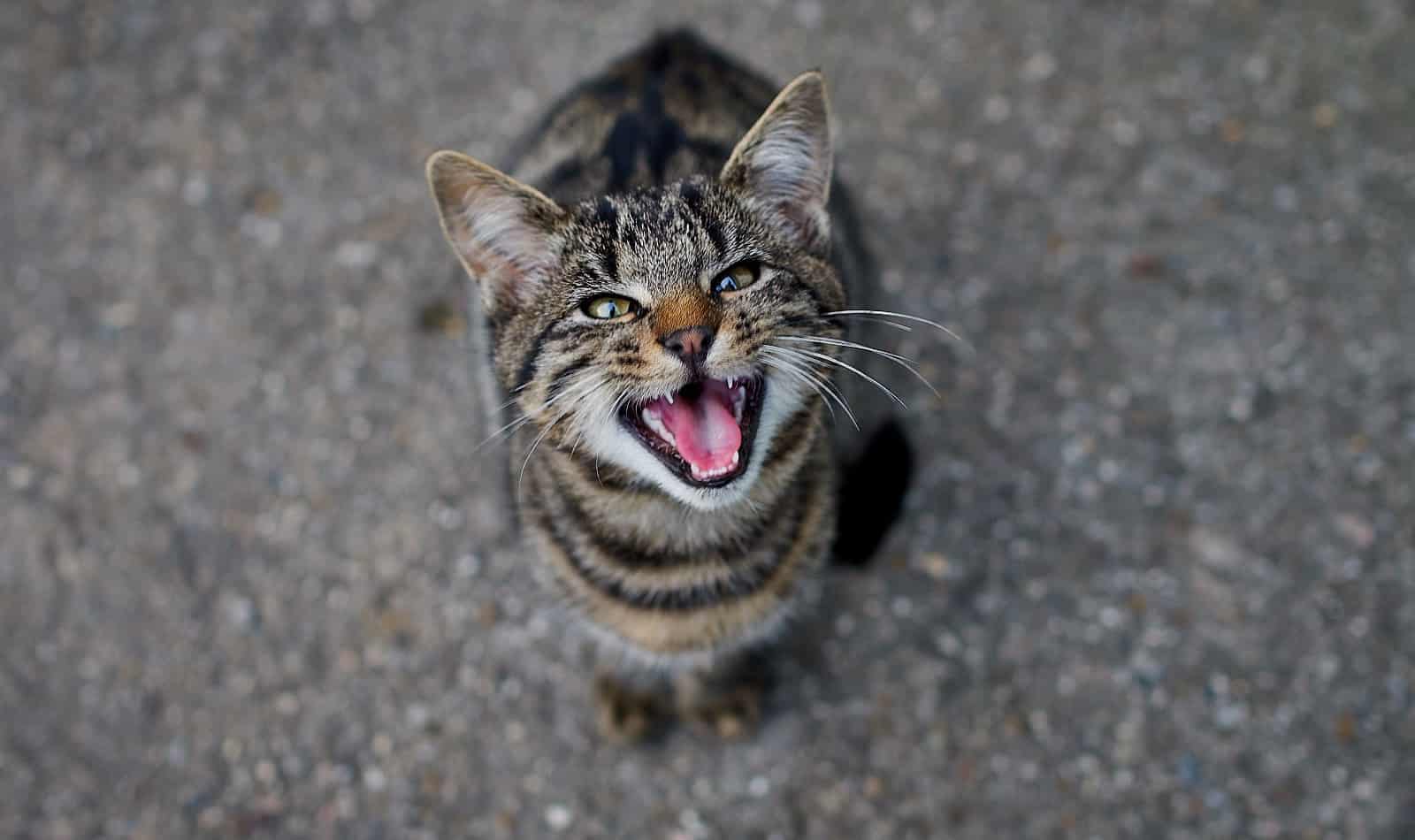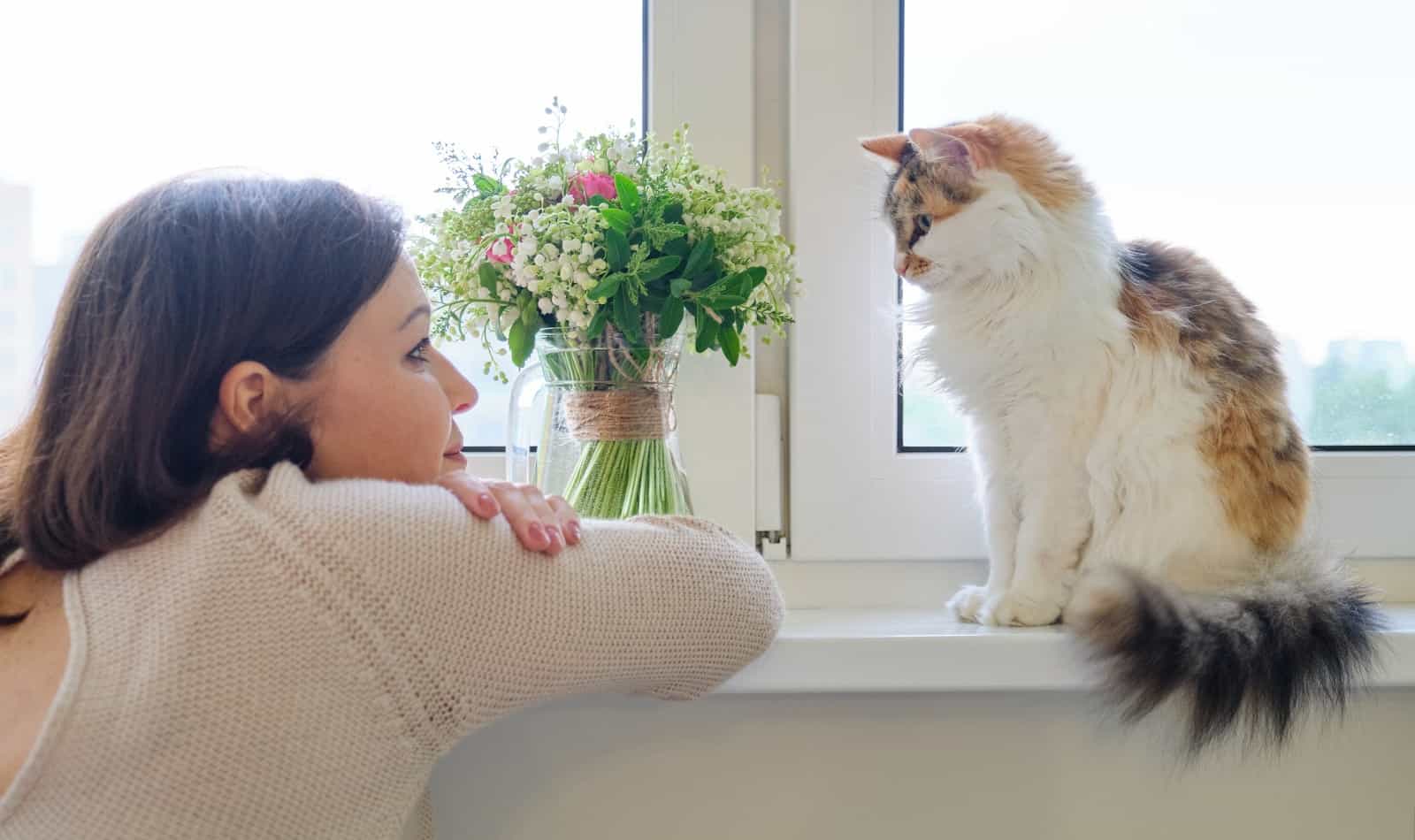Last Updated: 1 year ago
Are you wondering how to quiet your talkative cat because your kitty is driving you crazy with their constant crying and meowing?
Then you’ve come to the right place to find a solution to the problem.
Just keep reading to discover seven tips on how to deal with chatty cats.
7 Tips and Tricks on How To Quiet a Talkative Cat

You try to please your cat with yummy treats. You beg them to be quiet, and you bribe them with toys and attention.
Nothing works, and you become desperate and a little bit crazy trying to think of new ways to get your cat to shut up.
Does it sound familiar?
People often think that cats are independent, aloof, and quiet pets who spend most of their time napping on the couch, playing with toys, or grooming.
However, cats can be chatty companions who follow you around the house, expressing their opinions about everything and everyone.
They can even become a bit obsessed with you! Fortunately, you can do something about your cat’s chattiness. But first, we’re going to talk about why your cat never shuts up.
Why Are Some Cats Talkative?
Do you know that cats can make almost 100 different sounds? They meow, chirp, chatter, growl, hiss, yowl, snarl, and so on. It’s impressive!
Still, some cats are far more vocal than others and can sing you their song all day long.
To get these cats to be quiet, you have to understand why they’re meowing in order to apply the right strategy.
#1 They Want Attention
Most cats meow to attract attention.
They know that you’ll get up to check on them when they’re making noise and use it to their advantage to get a snack or a petting.
Usually, you’ve reinforced this attention-seeking behavior by responding to your cat’s meows.
You’ve taught your cat that you’ll come running when they’re chatty, and your smart feline uses it against you.
#2 They Want Food
Do you know that only kittens meow at their mothers? Adult cats never use meowing to communicate with other felines, but they still meow at humans.
Cats are talkative at times because they want something, usually food. They’re expressing their needs to you the same way a kitten would.
However, some cats might meow because you’ve forgotten to clean the litter box or the food bowl is empty of dry food.
In these cases, it’s for the best to listen to your cat, or you might regret it later when you discover a mess in the living room.
#3 Your Cat Is Bored or Lonely
Usually, cats don’t mind being alone in the house.
They find ways to entertain themselves and do all the things you’ve forbidden them to do (like sitting on the counter).
However, some breeds thrive on human company and are miserable when you leave them with no one around to worship them.
In other words, your cat might be lonely.
#4 Something Has Changed in the House
When your cat’s normal routine is disturbed, they might express how displeased they are by meowing excessively.
Moving house, adding another cat/dog, losing a pet or family member can affect a cat’s behavior more than you can imagine.
Cats do grieve in their feline way.
#5 Your Cat Is in Heat
Another common reason for excessive vocalization is hormonal changes related to mating.
Any female cat in heat can yowl day and night with no stopping and drive everyone in the house crazy.
The same goes for tomcats who become desperate to go out when they smell a female in heat.
If you don’t know better, the sound is so distressing you might think your cat is dying.
#6 It’s a Breed Thing
Some cat breeds are more talkative than others.
Siamese cats are the most talkative ones, followed by Oriental Shorthair, Burmese, Japanese Bobtail, Sphynx, and some Maine Coon cats.
On the other hand, Persians, Exotic Shorthairs, Norwegian Forest Cats, British Shorthair, and Scottish Folds tend to be quiet cats.
#7 Your Cat Is Getting Old
As your pet ages, their cognitive functions decline.
In other words, your cat might become confused, forget where their litter box is, and become more aggressive and anxious.
Hearing loss, stress, separation anxiety, and thyroid problems are also among the reasons why your cat might be meowing more than usual.
#8 Your Cat is Trying to Communicate with You
My cat talks back at me sometimes. I’m sure that yours do the same. But have you wondered why they do it?
While cats don’t understand what we’re saying, they’re smart enough to know that you’re talking to them.
They might meow back to acknowledge you and show that they’re listening.
#9 Your Cat is About to Give Birth
Some pregnant cats become very vocal before they give birth, especially first-time mothers.
Your cat might cry because she is scared, in pain, and wants your help.
Excessive meowing might also mean that birth isn’t progressing well, and your cat needs emergency help.
7 Tips on How to Deal With a Talkative Cat
Once you figure out why your cat is meowing, you can work on changing their vocal behavior.
I’m not going to lie and say that it’s a quick fix. It’s going to take time, patience, and consistency.
Fortunately, your job will be easier if you follow these seven tips and don’t give in to your cat’s pleading cries.

#1 Stop Encouraging Your Cat
The most important thing you must do is stop rewarding your cat for being loud. You don’t want to reinforce the behavior anymore.
Pay no attention to your cat when you hear them meow. Don’t look at your cat, don’t pet them, and don’t give food treats.
It’s going to be hard because cats are stubborn and can meow endlessly when they want something, especially food.
You’ve got to be strong and consistent in how you treat your cat’s meowing.
Otherwise, your cat will learn that you’ll give up if they “talk” to you long enough. Get earplugs.
#2 Reward Silence
Besides not encouraging the unwanted behavior, the other important step in dealing with a talkative cat breed is to reward silence:
- Wait until your cat stops meowing, even for a couple of seconds.
- Give your cat a tasty treat the moment they’re quiet.
- Some cat owners use a clicker to mark wanted behavior. It teaches the cats to associate the clicker’s sound with being quiet.
- Keep rewarding the quiet behavior. Your cat will eventually understand that being vocal gets them nowhere and that being quiet leads to petting and food.
#3 Provide Mental Stimulation
Since cats often become talkative when bored and lonely, you should make sure that your cat has plenty of entertainment.
Here are a couple of suggestions to keep your indoor cat happy:
- Place a bird feeder in front of the window. Birds are the cat’s equivalent of television.
- Add vertical space, such as cat trees, cat shelves, and window perches.
- Provide a variety of good toys that appeal to your cat’s taste.
- Consider a pet sitter if your cat spends too much time alone. You can also think about getting a second cat to keep yours company.
- Keep doors open.
#4 Spend Quality Time with Your Cat
People often assume that cats are anti-social because they seem reserved and cold towards people/other cats.
However, cats are capable of emotional attachment and need social interactions.
If you have a vocal cat and you’re often away, you need to spend quality time with your kitty to make up for your absence.
Give your cat the attention they need to be happy, and they will stop meowing.
#5 Rule Out a Medical Problem
Asking yourself, “Why is my cat so talkative all of a sudden?” One possibility: something might be wrong with your cat.
A sudden change in vocalizing behavior might indicate that your cat is ill and needs urgent medical attention.
Urinary tract infections, kidney disease, overactive thyroid, and other medical conditions can change your cat’s eating/drinking habits and lead to excessive meowing.
Cognitive dysfunctions are also a possibility, especially for old cats.
#6 Spay/Neuter Your Cat
If you’ve got an intact female/male cat, their constant yowling every couple of months can make your life hellish.
The best you can do is to spay/neuter your cat.
It’s better for your female cat’s health because spaying reduces the risk of mammary cancers and pyometra.
As for tomcats, neutering removes the hormonal urges to escape and seek females.
It also reduces aggression towards other male cats and spraying inside the house.
#7 Don’t Punish
Talkative cats can drive you crazy, but it’s imperative that you keep your temper at check and that you don’t punish your kitty.
Yelling, shouting, or throwing things at your cat is unacceptable.
Your cat won’t understand why you’re so mad and might become fearful of you.
Moreover, anxious and stressed cats are more likely to meow excessively because they’re afraid.
Instead of solving the problem, you’d be making it much worse.
Why Is My Talkative Cat Suddenly Silent?

Some cats rarely meow, and it can be days until you hear their soft voices calling for you. However, a chatty cat that goes silent and seems unable to meow is a reason to worry.
Sometimes when cats are trapped or stressed, they meow so much that they lose their voice.
The same thing happens to humans when you overuse your vocal cords. However, upper respiratory infections are often the reasons why cats lose their voice.
You might also notice a runny nose, eye discharge, lethargy, coughing, sneezing, and a lack of appetite.
More serious conditions responsible for the change in vocalization include growth and polyps in the throat, laryngeal paralysis, nerve damage, and hyperthyroidism.
It’s normal for some cats to be chatty and talk to you about everyone and everything. Rewarding good behavior and ignoring the bad one is the best strategy to get a cat to shut up.
Don’t use shock collars or other forms of negative reinforcement because you’re going to break your cat’s trust in you. Be kind and patient.
What do you think about these 7 tips on how to deal with a talkative cat? Does your cat like to talk back to you? Tell us Below!

This was a great read. I had no idea that cats could be so vocal. We’ve only ever had dogs so I haven’t experienced this.
Maybe this would work with the cats that I hear in the middle of the night. These sound like great tips
I don’t have any cats myself, but a close friend has a few because she does rescue. She has a couple of talkative ones and they’re so much fun. She doesn’t stifle their outspoken character. I completely understand why someone might though lol
Do these tips apply to quieting your talkative kids as well? Asking for a friend.
I recently had to put down my 16 years old cat Blue. I have two others. Squeak got very talkative and clingy all of a sudden, and I hadn’t thought it might be grief. He and Blue were together 10 years. I don’t know how to stop the talking at night especially at 2:30 am. I’ll give your advice a try.